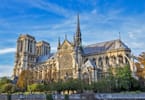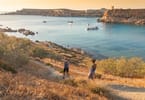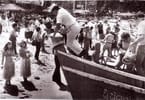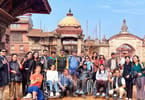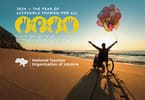Our first stop after leaving the capital Thimphu, on the journey east, is Dochu La Pass at 10,500 feet or approx 3,000 meters. Only 45 minutes from Thimphu, it offered us our second glimpse of the Himalayan range. Our first was on the flight into Paro airport on our inward journey from Bangkok.
At the pass we reached our highest point of the day, down here on the valley floor, although lower, I still had to catch my breath. You really started to notice the air was thinner. We hiked to Chimi Llakhang in Punakha. It is a temple dedicated to the 15th century figure known as the Divine Mad Monk. The locals go there to receive blessings of fertility.
We hiked about 3 kilometers through fields and empty rice paddies – our objective lay ahead, on a rise in a landscape dotted with small holdings and fields and streams.
It was a day like the previous one – bright, clear, and warm in the sun rays, but with a crispness that comes with altitude and cool air. The ground and air were bone dry – this was winter and water was plentiful in the brooks and streams, but no rain and no humidity.
The temple’s golden apex glittered in the bright morning sunlight as we traversed the fields and followed a small brook that flowed swiftly through the green and brown dirt fields and now empty rice paddies. The water was clear and ice cold. Temperatures drop to -5 degrees Celsius and lower at night.
The temple is dedicated to one of Bhutan’s more colorful characters. He was actually Tibetan and not a monk, but a devote Buddhist, who had a reputation as a womanizer and also enjoyed a tipple or two.
On the hike to the temple we passed many young women with babies wrapped in blankets who were carried snuggly in their mother’s arms or across their backs. They were on the way to the temple to give thanks and to make an offering to the image of the Tibetan for having been blessed with a child.
It’s a short step from womanizing to being a symbol and a celebration of fertility. Culturally it’s easier to swallow, being a more user-friendly image for the guide books. The locals, however, clearly believing the monk, even today, could help them to conceive.
Phallic symbols adorn buildings everywhere in the village en route to the temple and are even sold in the village shop.
The monks in the temple also tap you on the head with a wooden phallus and a replica of the mad monk’s bow and arrow (he rid the village of witches and fierce dogs according to folklore). Before you leave, the monk blesses you with holy water made with saffron which turns the water yellow, a symbolic gesture to all visitors which makes the journey to reach the divine monk’s temple even more satisfying.
The previous day we visited the Punakha Dzong – a gorgeous Dzong (fortress). The sun casts breathtaking light on the Dzong and the adjacent cantilevered bridge spanning the river.
The Dzong dominates the valley floor. Before Thimphu was made the capital of Bhutan, Punakha held the title as winter capital because of its more temperature climate. Thimphu’s monk body and the Je Khenpo (leader of Bhutan’s religious order) still come to Punakha to pass the winter and the Dzong is home to hundreds of monks.
Punakha Dzong was strategically built at the confluence of the Pho Chu (male) and Mo Chu (Female) rivers by the first Shabdrung Ngawang Namgyal of Bhutan, in 1637. It has been destroyed by four fires and an earthquake in 1897 and has frequently been devastated by flood water coming from the great northern glaciers.
The Dzong has now been fully restored to its original splendor. It is magnificent and a “must see” on a visit to Bhutan.
WHAT TO TAKE AWAY FROM THIS ARTICLE:
- The monks in the temple also tap you on the head with a wooden phallus and a replica of the mad monk’s bow and arrow (he rid the village of witches and fierce dogs according to folklore).
- They were on the way to the temple to give thanks and to make an offering to the image of the Tibetan for having been blessed with a child.
- He was actually Tibetan and not a monk, but a devote Buddhist, who had a reputation as a womanizer and also enjoyed a tipple or two.



